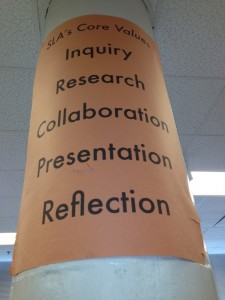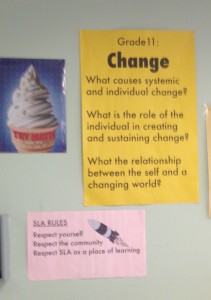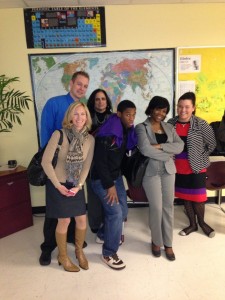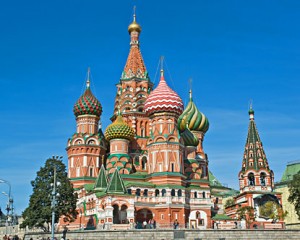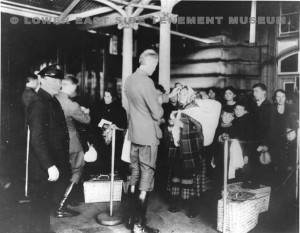I love it when ideas converge. I wrote a blog post on the plane traveling to ASCD 2013 on the concpet of uncertainty. Then, as luck would have it, soon after finishing my session, I had the opportunity to hear from Will Richardson. Honestly, I needed time to decompress after my session, but I couldn’t miss the man who has me wrestling with that enduring question… Why School? For 90 minutes Will took me to the future, through the past, and directly back to the present.
Will has an amazing gift of asking questions. For instance, reflect on these:
– Why School? (Buy this book!)
– What are the conditions for optimal, sticky learning?
– What are we doing in school that can not be Khanified?
– What do students need to learn in school when they can learn so much without us?
– Why college?
– What are the skills that our students need now to succeed?
– Where do we start?
I used to think I knew the answers to those questions. I am not sure (maybe a bit uncertain) as to what the future holds for our concept of “education.”
Will didn’t just leave us with big questions and then walk away. He gave us two words on how we can answer those (and many other questions).. BE BOLD! Along with those two powerful words, he gave us nine qualities of Bold Schools.
Bold Schools are…..
1. Learner Centered
2. Inquiry Driven
3. Support Authentic Work
4. Digital
5. Connected
6. Literate (by 21st Century Standards)
7. Transparent
8. Innovative
9. Provocative
Are you in a Bold School?
Thoughts on the plane (prior to the Be Bold session by Will Richardson) …
Are we facing something that we haven’t faced before? Are we entering a new age? Does anyone really know what tomorrow will bring? This is the age we are living in…. The age of uncertainty. It has appeared at the school doors, ready to be let in… Maybe even demanding to be let in!
Recently, as I reflected on my leadership as the principal of a Focus School, I thought about the concept of transparency. Am I open with my staff, or do I shoulder too much of the responsibility? Have I gotten away from the “many hands make light work”? Do I understand change, and uncertainty? These questions forced me to learn a valuable lesson, and it was my teachers who, once again, taught the lesson.
On a cool morning in march about 12 teachers participated in the first Transparency Leadership Committee (TLC). The TLC is designed to provide an opportunity for collegial discussions, problem solving, and transparency. I began this committee after I had a great talk with a teacher leader in the building. She presented concerns from the staff in such a professional way that I knew I had to take action.
I began the meeting by recapping the recent professional development I attended through the state DOE and local RAC. My gut was telling me that the staff was wondering why I was out of the building so much. Then it hit me. Although that could have been a concern, the most important concern they had was what in the world was going on next year with the impending uncertainty of teacher evaluations, common core, parcc, and the model assessments. These just happened to be the topics I have been working on this year!
As I reflect on the meeting, I learned that transparency can open the door to understanding uncertainty. As a leader, I have to balance the responsibility of being the “lead learner” (thanks @joe_mazza) with being a “systems thinker” (thanks @drgentile_mps) and “story teller-in-chief” (thanks @nmhs_principal). Now I am working on being the systemic, transparent learner in chief…. In the age of uncertainty (thanks @willrich45)
“To be truly innovative you have to look beyond what’s easy and focus in what’s right” Nick Update, OnStar

